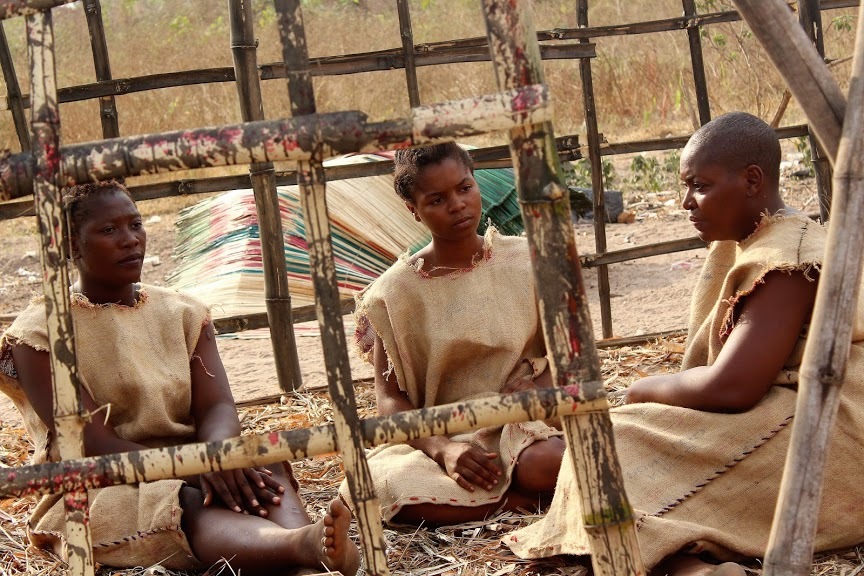Born in Lagos, Nigeria, Funmi Holder has acted in over 25 movies since she made her debut in the Nigerian film industry. Her big break came in 2010, when she took the role of Amaka Okoh in the popular M-Net soap opera “Tinsel,” a role she still plays to date. In 2016, Holder took the plunge into filmmaking with her debut Nollywood film, “The Grudge.”
“Efunsetan Aniwura” will screen at the 2020 American Black Film Festival, which takes place August 21-30. Joshua Ojo co-directed the film.
W&H: Describe the film for us in your own words.
FH: “Efunsetan Aniwura” is the true story of a Yoruba woman who lived in the Old Oyo Empire in the western part of Nigeria in the 18th century. She was a political leader who had a lot of wealth, power, and influence. She played a major role in the selling of the Yoruba people to the British during the colonial era. Efunsetan was known to have killed some of her slaves that went against her rule to never get pregnant, [which she imposed] after she lost her only child.
This film takes us through her life from birth till the day she died.
W&H: What drew you to this story?
FH: I am a Yoruba woman by birth, and have lived all my life in Nigeria. When I was in high school, we read about Efunsetan as part of our literature classes — that was when I developed an interest in this powerful woman.
I have always known that I wanted to be a filmmaker so as soon as I got the opportunity, so I decided to make my dream come true by exploring her history and who she really was. I wanted to tell the world about this woman.
W&H: What do you want people to think about after they watch the film?
FH: I hope that people will find it entertaining, first of all, as well as educational. I want people to understand her motivations and some of the good things she did because in Nigeria, what we hear mostly is that she was all bad, which isn’t true. She was a feminist who also fought for women’s rights and I find her strength, courage, and resilience worth emulating.
I want people to know things about her that they probably didn’t know before.
W&H: What was the biggest challenge in making the film?
FH: The whole project was challenging all together because in Nigeria there isn’t much support for independent filmmakers; this makes the whole process twice as challenging.
Raising the funds, building the sets, and finding the right cast to embody the characters was also a bit of a challenge.
W&H: How did you get your film funded? Share some insights into how you got the film made.
FH: I funded “Efunsetan Aniwura” myself. I worked hard and saved hard. I got support in other ways but all the financial responsibilities were on me. It is an independent film produced by me.
W&H: What inspired you to become a filmmaker?
FH: I love to see written words come to life. I love the fact that I can just conceive an idea in my mind, put it on paper, then bring it to life on a screen. I also love entertaining people, as I started my career in acting before I went into producing and directing.
W&H: What’s the best and worst advice you’ve received?
FH: The best advice I have received is to never cut corners — always strive for excellence because you never know who is watching.
The worst advice would be to think people only want to see certain types of movies. I chose not to follow the crowd and go after what some people regard as “popular.” I want to be original, and I want to be known for quality movies that will stand the test of time.
W&H: What advice do you have for other female directors?
FH: Do not let anyone tell you what you should or shouldn’t be doing. Follow your passion. As long as you believe in it, it will work for you in the end. It may take time and a lot of hard work, but keep going.
Also, don’t be afraid to take risks or stand out. It’s better to be different than be like every other producer/director out there.
W&H: Name your favorite woman-directed film and why.
FH: It would be “Thirteen” by Catherine Hardwicke. I think that was a masterpiece. The film was shot mostly with handheld cameras. She really explored the emotions of the characters and you can almost feel it through the screen. I admire her style.
W&H: How are you adjusting to life during the COVID-19 pandemic? Are you keeping creative, and if so, how?
FH: Thankfully, COVID-19 isn’t that bad in Nigera. We are almost out of the woods, but we are still taking the necessary precautions of course. I have been keeping busy by writing and developing my next film project.
W&H: Recent protests in the U.S. and abroad have highlighted racism and anti-Black police brutality. The film industry has a long history of underrepresenting people of color onscreen and behind the scenes and reinforcing — and creating — negative stereotypes. What actions do you think need to be taken to make Hollywood and/or the doc world more inclusive?
FH: I know this discrimination has been an issue for a very long time — people of color have always felt marginalized all over the world, it’s not just in the United states. Even in Nigeria, the lighter-skinned people are more favored in general than dark- or chocolate-colored-skinned people. It’s an ongoing battle that we need to keep fighting.
We are all equal and should be treated as such. Our movies should also reflect this and I think we are making good progress.
https://vimeo.com/336395961







